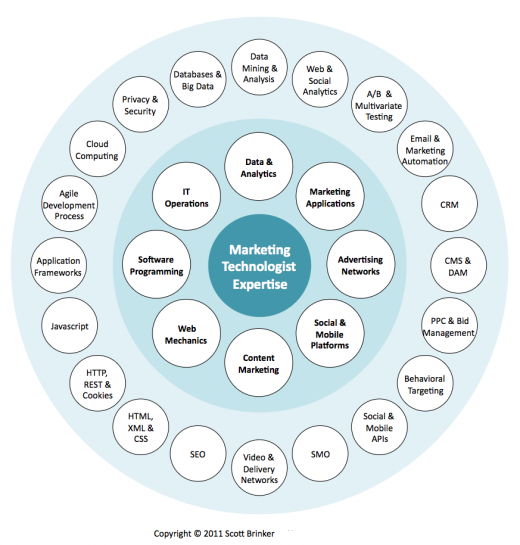The Role of Marketing Tech

The role of a marketing technologist is a hybrid position that combines marketing expertise with a strong understanding of technology. Marketing technologists play a crucial role in today's digital landscape, where technology and marketing are increasingly intertwined. This role requires individuals to bridge the gap between marketing teams and technology departments, ensuring that businesses leverage the latest tools and platforms to enhance their marketing efforts.
Key responsibilities of a marketing technologist include:
-
Technology Integration: Marketing technologists are responsible for integrating various marketing technologies into the overall marketing strategy. This includes tools for customer relationship management (CRM), marketing automation, analytics, content management, and more. They need to understand the functionalities of these tools and how they can be used to achieve marketing goals.
-
Data Analysis: Marketing technologists analyze data to derive insights that can inform marketing strategies. They work with large sets of data from various sources, applying analytics to understand customer behavior, preferences, and trends. This data-driven approach helps optimize marketing campaigns for better performance.
-
Collaboration with IT: Marketing technologists act as a liaison between marketing and IT departments. They work closely with IT professionals to ensure that marketing technologies are effectively implemented, integrated, and maintained. This collaboration is essential for a seamless flow of data and information across different systems.
-
Strategy Development: With a deep understanding of both marketing and technology, marketing technologists contribute to the development of marketing strategies that align with overall business objectives. They identify opportunities for innovation and suggest ways to use technology to gain a competitive advantage in the market.
-
Digital Transformation: Marketing technologists are often instrumental in driving digital transformation initiatives within organizations. They help businesses adapt to the rapidly evolving digital landscape by implementing new technologies, processes, and best practices.
-
Training and Education: Given the dynamic nature of technology and marketing, marketing technologists are responsible for staying updated on the latest trends and advancements. They also play a role in educating marketing teams about new tools and technologies, ensuring that the entire marketing department is equipped to leverage these resources effectively.
-
Measurement and Reporting: Marketing technologists establish key performance indicators (KPIs) and use analytics tools to measure the success of marketing campaigns. They generate reports that provide insights into the effectiveness of various marketing strategies, helping teams make informed decisions for future initiatives.
In summary, the marketing technologist role is a critical one in today's digital era, requiring individuals to possess a unique blend of marketing acumen and technological expertise. By seamlessly integrating technology into marketing strategies, marketing technologists contribute to the overall success and competitiveness of businesses in the modern marketplace.

ADVANTAGES OF HAVING A MARKETING TECH
Having a marketing technologist in a company's marketing department can bring numerous advantages, leveraging the synergy between marketing expertise and technological know-how. Here are some key benefits:
-
Efficient Technology Integration: Marketing technologists understand the marketing technology landscape and can seamlessly integrate various tools and platforms into the marketing workflow. This ensures that technology investments align with marketing goals, optimizing processes and enhancing overall efficiency.
-
Data-Driven Decision Making: With a strong background in data analysis, marketing technologists can harness the power of data to inform marketing strategies. They can derive actionable insights from customer behavior, preferences, and market trends, enabling the marketing team to make informed decisions that resonate with the target audience.
-
Improved Collaboration: Marketing technologists act as a bridge between marketing and IT teams. Their presence facilitates better communication and collaboration between these traditionally separate departments. This alignment ensures that technology solutions support marketing objectives and that any technical challenges are addressed promptly.
-
Strategic Innovation: Marketing technologists are well-positioned to identify and implement innovative technologies that can give the company a competitive edge. They can explore emerging trends, such as artificial intelligence, augmented reality, or chatbots, and assess their potential impact on marketing strategies, allowing the company to stay ahead of the curve.
-
Digital Transformation Leadership: Companies looking to undergo digital transformation can benefit significantly from a marketing technologist's expertise. These professionals play a pivotal role in guiding the organization through the process of adopting and adapting to new technologies, ensuring a smooth transition and maximizing the benefits of digital initiatives.
-
Optimized Marketing Technology Stack: Marketing technologists can evaluate, select, and optimize the use of marketing technology tools. This results in a well-curated marketing technology stack tailored to the company's specific needs. This optimization can lead to cost savings, improved performance, and a more streamlined marketing process.
-
Enhanced Measurement and ROI: Marketing technologists establish meaningful KPIs and implement robust analytics frameworks to measure the success of marketing campaigns. This focus on measurement and analytics enables the marketing team to track return on investment (ROI) more effectively and make data-driven adjustments to improve campaign performance.
-
Adaptation to Industry Changes: The marketing landscape is constantly evolving, with new technologies and trends emerging regularly. Marketing technologists are well-equipped to navigate these changes, ensuring that the company stays adaptable and can quickly incorporate new tools and strategies into its marketing approach.
-
Cross-Functional Training: Marketing technologists often play a role in training marketing teams on the effective use of new technologies. This ensures that all members of the marketing department are up-to-date on the latest tools and can leverage them to their full potential, fostering a culture of continuous learning and improvement.
-
Increased Competitiveness: Ultimately, having a marketing technologist on the team contributes to the company's competitiveness in the market. By combining marketing strategy with technological innovation, the company can deliver more targeted, personalized, and effective marketing campaigns, setting itself apart from competitors.
In conclusion, the advantages of having a marketing technologist in a company's marketing department extend beyond operational efficiency to strategic innovation and market competitiveness. This role is increasingly vital as companies seek to navigate the complex intersection of marketing and technology in the digital age
. 


